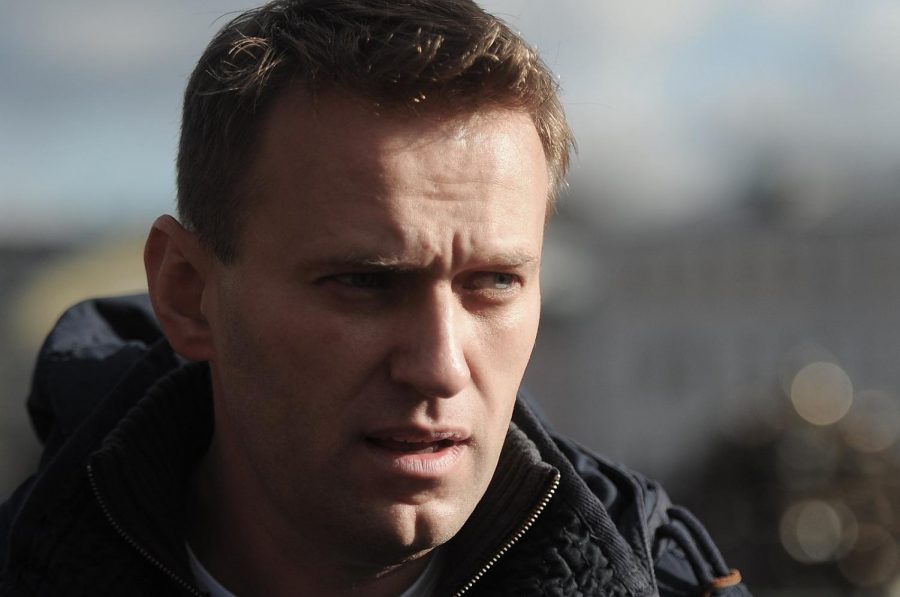Opinion | Navalny faces another inflection point
Photo Courtesy of Dmitry Aleshkovsky/Wikimedia Commons
Russian lawyer Alexei Navalny stares with intent on Oct. 22, 2011. Columnist Eddie Ryan argues that Navalny is facing a turning point in his career.
May 11, 2021
At the moment, one thing in Russia seems clear: Alexei Navalny has disrobed the emperor, or when in a more generous mood, allowed him just a pair of proverbial undergarments.
For in his decade and a half of political relevance, this blogging dissident lawyer has succeeded in embarrassing and frightening “Vladimir the Underpants poisoner” and in catalyzing substantial popular rancor against the autocrat. With present circumstances appearing rather inauspicious, however, Navalny’s veritable political impact — along with his own image — remains unsolidified.
What has been perhaps his apogee in the international spotlight these past few months followed from years of oppositional activity against Putin, with the overarching message targeting deeply entrenched bureaucratic corruption and expropriation. Departing from the socialist-democratic Yabloko party in 2007 to form his own “NAROD” party — Russian for “people” — Navalny launched his Youtube-based campaign of anti-Putin invective.
Keen to draw on a pool of often confused nationalist sentiment, his earliest political pronouncements — in addition to lambasting the United Russia party — featured calls to ban immigration from the Caucasus and Central Asia and support for Russian aggression in Georgia in 2008. In 2011, he attended and defended the “Russia March,” an annual conglomeration of nationalisms sometimes laden with anti-Semitism.
Over time, Navalny refined his message, honed his media savvy and amassed both an enthusiastic, young audience and a robust national network of oppositional activism.
Get The Daily Illini in your inbox!
Chief among his efforts are a near successful mayoral campaign in Moscow, the mobilization of thousands to unify around one of Putin’s fake adversaries at the ballot box — a highly potent symbolic feat dubbed “smart voting” — and the work of his Anti-Corruption Foundation, or FBK.
Sensing the threat, in 2014 Putin had him pinned for embezzlement — the classic legal tactic deployed to insulate his power and silence adversaries — which brings Navalny’s story to where it is today. For it was a purported violation of the parole terms of these charges which, leveled in 2020, have landed him in a Russian penal colony jail.
To make matters more obscene, Navalny’s “parole violation” came in 2020 while he sought medical treatment in Berlin after suffering a chemical weapons assassination attempt strongly suspected as the work of the Kremlin. The nerve agent Novichok had been smeared on his underpants.
Navalny now sits idly in prison awaiting his sentencing while international condemnation from the European Commission on Human Rights and elsewhere trickles in.
His visage is gaunt and sickly after a 24-day hunger strike in which he nearly died. Thousands have been detained by police in recent days in protests not quite of pre-pandemic magnitude. His network and foundation have declared an effective shutdown in the face of a bogus judicial move to classify them as “extremist.”
The question thus lingers: What does this mean for Russia? Navalny evokes the imperfect but valiant resistor and inspires both hope and trepidation — the latter in particular on the left.
Politically he has cleaned up a bit by focusing on anti-corruption instead of immigration, but while he has apologized for his Georgia stance, he has not done so on other fronts. While he supports same-sex marriage and a significant minimum wage increase, he was tepid at best in his opposition to Russia’s annexation of Crimea.
As scholar Eliot Borenstein succinctly puts it, Navalny “is not Nelson Mandela. He’s Aung San Suu Kyi,” the formerly adored but now tainted Burmese democratic leader engaged in a dramatic struggle with fascist thugs for her country’s freedom.
Nor does a comparison to Aleksandr Solzhenitsyn, the Soviet writer whom Ford declined to invite to the White House at the behest of Henry Kissinger, feel apt — at least not to the writer in his prime. Though the freedom ethos is there, Navalny has offered neither the incisive critique nor the cultural contributions of the man who anatomized the gulags.
Still, as Masha Gessen points out, perhaps Navalny’s nationalism is more civic than ethnic, a function of the pragmatic political necessities of the Russian landscape. He’s on record stating that his aim in connecting with the misguided among the nationalists is to educate them away from misplaced xenophobia and anti-Semitism and toward a pointed hatred of their president.
Undoubtedly the most fascinating element of this man is what he reveals about Russia. Navalny is a product and a composite reflection of many Russian idiosyncrasies. Such is visible in his coalition-building which, though often unsavory, might be necessary. Putin’s grip on Russian “democracy” renders otherwise meaningful political distinctions rather vague, meaning that it’s plainly Putin versus the many striped opposition.
In the face of this cold regime, redolent of tsarism and Soviet empire, Navalny stands as a slightly unevolved but liberty-affirming answer to the latest iteration of Russia’s storied national identity question. His cause merits serious support, and Navalny needs it if the seed he has planted is to fully germinate.
Eddie is a sophomore in LAS.







